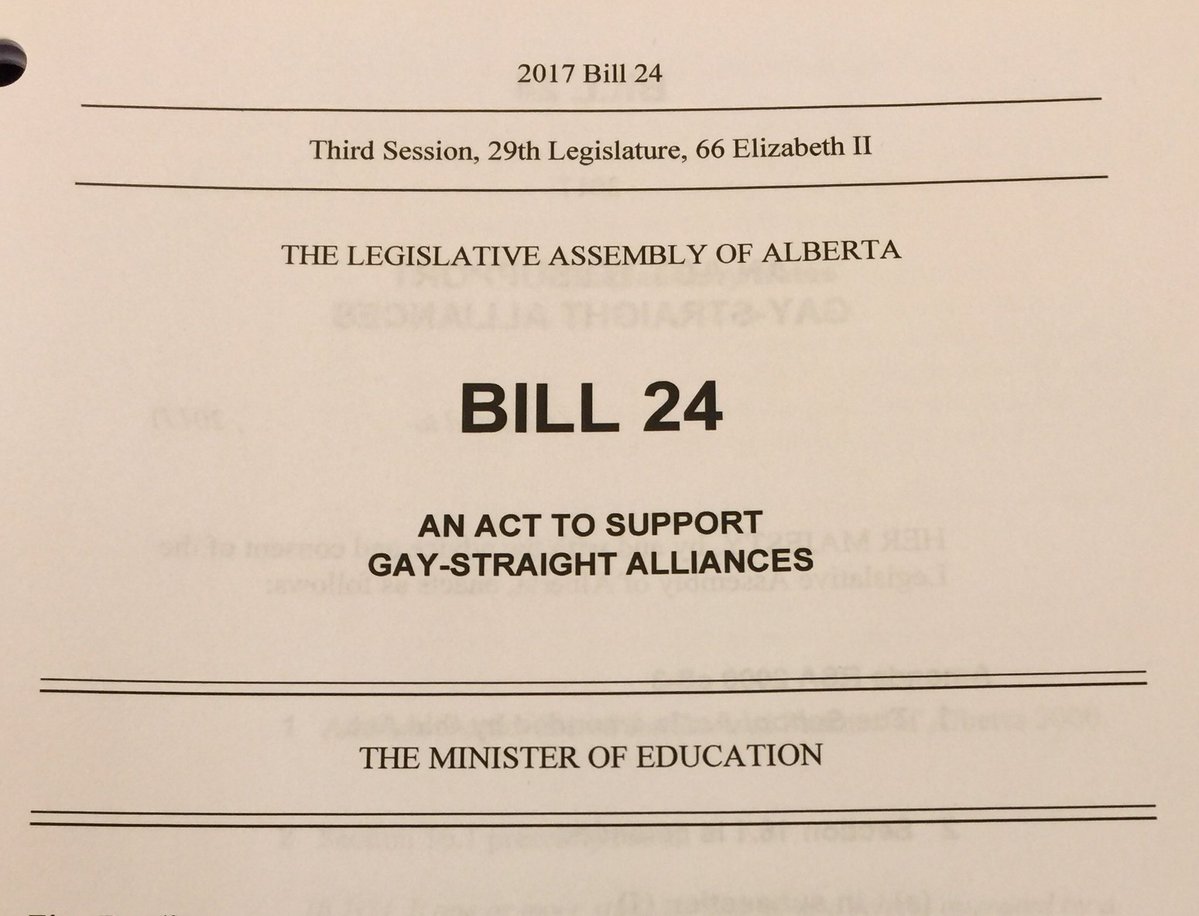In November of 2017, the Alberta Government passed Bill 24, An Act to Support Gay-Straight Alliances. The readings were met with significant support, but also a great deal of resistance.
What is Bill 24?
Bill 24 is a bill that amends to the School Act with the intent to strengthen existing supports for GSAs/QSAs and provide more backbone to school initiatives to create safer, more welcoming environments for students.
What does Bill 24 do?
Quoted directly from the Province of Alberta webpage outlining Bill 24:
Bill 24 will amend the School Act to:
– require all publicly funded schools to create welcoming, caring and respectful policies and make them publicly available
– strengthen Minister of Education’s ability to ensure every school complies with the law
– protect the privacy of students that join a GSA or QSA
– protect the establishment of GSAs from political interference
– ensure principals help students create a GSA or QSA in a timely manner
What does Bill 24 NOT do?
There is a lot of misinformation about Bill 24 and fear about how it will impact families. To clarify what the bill does not do:
- Bill 24 does not prevent families from discussing LGBTQ2S+ issues at home in the manner they feel is appropriate.
- Bill 24 does not prevent families from asking their youth if they attend their school’s GSA.
- Bill 24 does not prevent families from inquiring what activities students parttake in with their GSA.
- Bill 24 does not prevent families from being informed if their youth is at risk of harm (from either themselves or from others)
- Bill 24 does not prevent families from being loving supports for their youth.
Coming Out / Being Outed
A significant portion of the controversy surrounding Bill 24 has been the debate about parental rights versus a youth’s right to privacy. Advocates for LGBTQ2S+ youth argue that Bill 24 was needed to protect vulnerable youth by making it ensured that they can explore their identity in safety without fear of being outed. But what does that mean?
Coming out is the process by which an individual discloses their sexual orientation and/or their gender identity. In contrast, the act of disclosing an individual’s sexual orientation and/or gender identity without their consent is called outing. While coming out can be an empowering event where an individual shares a vulnerable aspect of themselves to people they trust, outing is an act of betraying trust and subverting an individual’s agency.
Outing can put vulnerable youth in unsafe positions as not every family is accepting. Nearly one in three youth in Alberta experiencing homelessess identify as LGBTQ2S+, which is a worrying overrepresentation given that LGBTQ2S+ youth almost certainly are not 33% of the overall youth population in the province. Homelessness is not the only risk, physical and emotional abuse are real dangers in extreme cases, but even if an individual’s situation is not the extreme, there is risk of emotional distress. Experiencing a betrayal as serious as outing can impact mental health even if physical or emotional abuse are not realistic factors. Trust issues, anxiety, depression, and feelings that there was a violation of agency and consent can result from youth being outed before they feel safe and ready, none of which are desirable outcomes.
Youth will come out when they are ready, and are the best judges of when they are safe to do so. It is not the place for school staff to out their students to families, nor is it right for families to dictate when their youth is ready to come out. Developing relationships based on trust and communication is vital to supporting LGBTQ2S+ youth in their journey toward self-acceptance and coming out. Bill 24 simply removes the possibility of school staff acting as a middleman, effectively removing a third party from the family-youth relationship.

